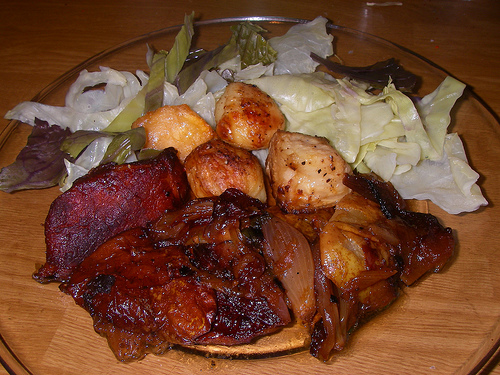Affordable and delicious
For most of my life, cuts of meat were something of a mystery. That's still the case, but I have at least managed to identify a few different categories, and know what to do with them. One of the recent cuts that I decided to research and demystify is the pork roast.
Why should you figure out what to do with a pork roast? Because it is cheap! Have you seen the cost of meat lately? It's crazy! Even basic cuts of meat cost about $5/lb where I live. One of the few cuts that you can buy for less than that is the various pork roasts, all of which run around $2/lb.
Which pork roast do you want? Well, it doesn't really matter. As long as you are choosing a true roast, and not one of the various tenderloin products. You can most easily identify the right pork roast by price, it will usually be the cheapest form of pork. It will also be the largest - I rarely see a pork roast that clocks in at less than two pounds.
Look for the word "roast" or "shoulder" somewhere in the cut description. Picnic roast, pork shoulder blade roast, pork shoulder roast, the specifics don't really matter. Once you find the right section of the meat case, just pick out whatever looks best.
Pork roasts are tough cuts of meat, which means that they respond best to a long, slow cooking process. A slow cooker is ideal for this. You can pop that baby in when you leave for work in the morning, and when you come home at night it will be juicy, tender, and ready to eat. (And your house will smell amazing!)
On a day when you will be home to mind the oven, you can also cook them either on the stovetop or in the oven. You can do either a dry roast or a wet roast (technically called "braising"). I recommend braising, because it will make the meat a lot more tender.
Your basic procedure will be to put the roast in a pot with a lid, add 1-2 cups of liquid, then cook it at a low temperature (say, 300 degrees) for a long time (say, 2 hours per pound). Check it every hour or so, to make sure it hasn't run dry.
Prepare ahead: this is not a fast process, and it can often take longer than that. Start it well in advance of dinner time! You can't really overcook a roast, so err on the side of putting it in too early.
Here are some great pork roast recipes to get you started:
